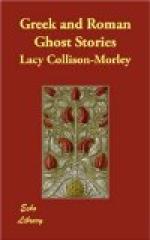supernatural that came in his way. The ring was
made from the iron of a cross on which a criminal
had been executed, and doubtless had the same value
in Eucrates’ eyes that a piece of the rope with
which a man has been hung possesses in the eyes of
a gambler to-day. On this particular occasion
he had left his men at work in the vineyard, and was
resting quietly at midday, when his dog began to bark.
At first he thought it was only a favourite boy of
his indulging in a little hunting with some friends;
but on looking up he saw in front of him a woman at
least three hundred feet high, with a sword thirty
feet long. Her lower extremities were like those
of a dragon, and snakes were coiling round her neck
and shoulders. Eucrates was not in the least
alarmed, but turned the seal of his ring, when a vast
chasm opened in the earth, into which she disappeared.
This seems rather to have astonished Eucrates; but
he plucked up courage, caught hold of a tree that
stood near the edge, and looked over, when he saw
all the lower world lying spread before him, including
the mead of asphodel, where the shades of the blessed
were reclining at ease with their friends and relations,
arranged according to clans and tribes. Among
these he recognized his own father, dressed in the
clothes in which he was buried; and it must have been
comforting to the son to have such good evidence that
his parent was safely installed in the Elysian Fields.
In a few moments the chasm closed.
Dio Cassius[108] relates how Trajan was saved in the
great earthquake that destroyed nearly the whole of
Antioch by a phantom, which appeared to him suddenly,
and warned him to leave his house by the window.
A similar story is told of the poet Simonides, who
was warned by a spectre that his house was going to
fall, and thus enabled to make his escape in time.
I will include here a couple of stories which, if
they cannot exactly be classed as stories of warning
apparitions, are interesting in themselves, and may
at least be considered as ghost stories. Pliny
the Younger[109] tells us how a slave of his, named
Marcus, imagined that he saw someone cutting his hair
during the night. When he awoke, the vision proved
to have been a true one, for his hair lay all round
him. Soon afterwards the same thing happened
again. His brother, who slept with him, saw nothing;
but Marcus declared that two people came in by the
windows, dressed in white, and, after cutting his hair,
disappeared. “Nothing astonishing happened,”
adds Pliny, “except that I was not prosecuted,
as I undoubtedly should have been, had Domitian lived;
for this happened during his principate. Perhaps
the cutting of my slave’s hair was a sign of
my approaching doom, for accused people cut their
hair,” as a sign of mourning. One may be
allowed to wonder whether, after all, a fondness for
practical joking is not even older than the age of
the younger Pliny.




